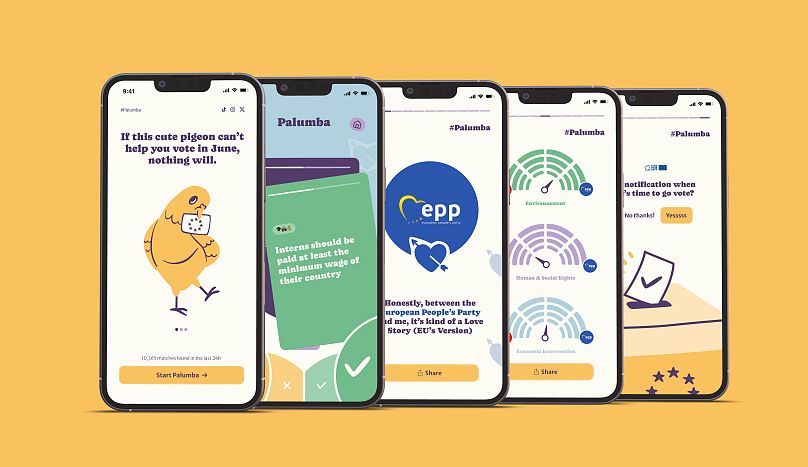An association of young professionals came up with a solution to boost youth participation in EU elections.
Don’t know who to vote for yet in the EU elections? This app may be for you.
Today (April 30) saw the launch in Barcelona of Palumba, a new voting advice application. Only a select group of early users will test the beta version of the app before it will be become public on May 9; Europe Day.
The principle is simple: as with the popular dating site Tinder, users “swipe” right for proposals they agree with and left for those they dislike. Additionally, the app offers options for mild approval or disapproval, as well as a neutral response. Reactions to proposals are then “matched” with a political group of the European Parliament and redirected to corresponding national lists according to the origin of the user.
The algorithm accounts for manifestos and public declarations but also historic voting patterns from the European Parliament because for Palumba users, it “shows better what they do and not only what they say they will do.”
Palumba will not just match with political parties but, as with a regular dating profile, when clicking on the proposal more details will be given: in this case, definitions and political context from verified sources.
Bursting the EU Bubble
Originating in August 2023 during the European Forum Alpbach in the Austrian Alps, the idea sought to translate the “EU Bubble” into everyday youth language to spark a political conversation and push them to vote. “The logic is not to influence the vote in one direction, but to make it clear that there are parties who support their ideas and so, it might be worth voting,” Thomas Garnier, the secretary and R&D coordinator of Palumba told Euronews.
The project is pan-European: available in more than 30 languages (including regional dialects) and in the 27 Member States. The name also reflects this commitment. Palumba is the contraction of “columba palumbus”, the Latin name of the common pigeon, found throughout Europe. “The pigeon is in everyone’s daily life, it creates this link that we found really cool,” said Palumba President Pol Villaverde.
The launching of the beta app coincides with the new phase of the European Parliament’s communication strategy, which Palumba is designed to supplement. “We are really trying to reach where they are not able to reach,” said Villaverde, adding that the Parliament is “very well aware of how limited they are in their capacities to reach people who are not already convinced”.
Viral effects are key to the app concept. The interface has been designed to be pleasant and easy to share on social media. Users can share results – such as their most important political commitments - to display and compare with friends in a manner akin to “Spotify Wrapped”, a function that allows Spotify users to share their most heard songs or artists of the year.
This June, some 365 million people will be eligible to vote in the EU Elections, including many young voters for whom social media is a vital resource for campaigning. Four countries – Belgium, Germany, Malta and Austria – will allow 16-year-olds to vote, in Greece the minimum age to vote is 17.
A recipe that has already proved successful
Dozens of voting advice apps have already been used in Europe and abroad with proven positive impacts on voter participation. “We are not reinventing the wheel” admitted Palumba’s president.
In the 2022 presidential campaign in France, a similar app called “Elyze” became popular, reaching more than 1.2 million downloads in two weeks. However, the app got criticised for allegedly biased results, the opacity of its source code and the amount of private data harvested and its weak protection.
Conscious of the potential risk or criticism, Palumba said the app is committed to minimal data collection, robust protection measures against foreign interference, and total independence from political parties or sponsors. Moreover, the app's source code is publicly available, ensuring transparency.




